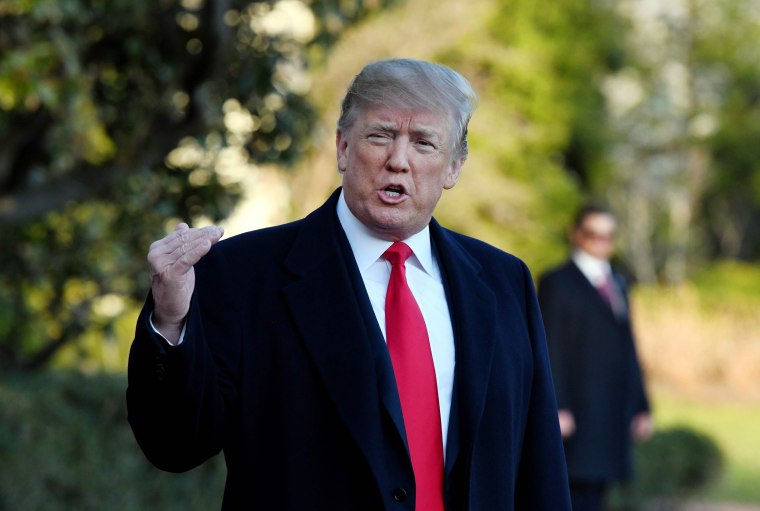Hours after President Donald Trump told a group of Missouri donors that Japanese regulators were dropping bowling balls on American automobiles to keep them off the market, the White House insisted the president's anecdote was just an allegory.
"Obviously, he's joking about this particular test,” Press Secretary Sarah Huckabee Sanders said Thursday afternoon, telling a reporter who said he’d covered the auto industry in Japan that Trump's anecdote was merely "illustrative of creative practices” countries use to keep American goods out of their markets.
But the president, delivering the story Wednesday evening, offered no indication that he was joking. He told donors that one American automaker had spent hundreds of thousands of dollars to build a model car to test the Japanese regulatory barriers, only to be foiled by this specific test.
"It’s called the bowling ball test. You know what that is? That’s where they take a bowling ball from 20 feet up in the air and drop it on the hood of the car. And if the hood dents, the car doesn’t qualify,” Trump said at a Missouri fundraiser, an audio recording of which was obtained by NBC News. “It’s horrible, the way we’re treated.”
Reporters scrambled to find factual footing. Was it this Japanese pedestrian safety test, which employs a head-shaped object roughly the size of a bowling ball? Or maybe Trump was thinking of a Nissan ad, The Washington Post suggested.
"I have no idea what he was talking about," said Kristin Dziczek, a director at the independent research firm Center for Automotive Research.
However, regulatory barriers are a very real issue in car exports, she said, as different countries employ different standards for things like emissions, safety and fuel economy.
Japan is not the only place where the U.S. faces hurdles. The center estimated in one study that regulatory differences between the European Union and the United States cost the auto industry $3.3 billion to $4.2 billion per year — more than the tariffs imposed by the E.U. and U.S. on the foreign-made cars crossing borders.
Dziczek said the Trans-Pacific Partnership eased the regulatory hurdles American automakers face selling cars in Japan, by allowing signatories to use the same expedited review processes domestic Japanese carmakers enjoyed with their vehicles. But Trump withdrew from the TPP shortly after his inauguration, sending the U.S. back to Square 1 when it comes to regulatory obstacles in the auto market.
James Fatheree, vice president for Asia for the International Affairs Division of the U.S. Chamber of Commerce, was also unfamiliar with Trump's claim.
"I’ve not heard about a bowling ball being dropped on a car," Fatheree told NBC News. "Usually, automotive safety tests are not allegorical."
He said that in recent years, Japan has sought to help make it easier for exporters, as it did under the TPP trade deal.
As for the supposed test being illustrative of real "creative practices" countries might use to keep American-made goods out, Fatheree said simply: "No cars would pass that test."
